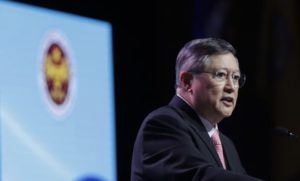MANILA, Philippines — Amid the wildest stock market gyration in over a decade and people opting to hold on to cash for possible emergencies, the central bank at the weekend urged calm among the public, saying the Covid-19 outbreak “is a public health crisis” and “not an economic crisis.”
In a lengthy mobile phone message sent to the media 30 minutes before midnight of Friday, Bangko Sentral ng Pilipinas Governor Benjamin Diokno said Filipinos should “keep the faith” and “focus on how to delay the spread” of the coronavirus.
“The irrational behavior of consumers (hoarding of masks, panic buying), investors (sharp fall of stock markets all over the world), and some banks (unusually heavy cash withdrawal from BSP) is based on fear, not fact,” he said. “But what is needed at these trying times is evidence-based, clear thinking.”
Banking sources told the Inquirer that the central bank is now in the process of formulating a relief package for Philippine banks and their borrower-clients. The scheme will entail the granting of leniency by lenders to their borrowers, many of whom are small and medium enterprises whose operations will be severely affected by the Metro Manila-wide community quarantine measures that will start this weekend.
“The guidelines are being finalized, and they will be issued ASAP,” an official with knowledge of the measures said. It remains unclear, however, if the banks — themselves borrowers of the funds that are re-lent to clients — will themselves receive leniency from their own creditors.
In his statement to reporters, Diokno, who marked his first anniversary as the country’s chief financial regulator earlier this month, said the central bank’s Monetary Board is ready to deploy any or all its policy tools to address all challenges to the Philippines’ financial markets and growth prospects.
“For all BSP supervised financial institutions, the Monetary Board has approved the grant of temporary and rediscounting relief measures to [financial institutions],” he said. “No doubt, Covid-19 has a potential impact on the operations of [these financial institutions] in terms of risks related to borrowers or businesses severely disrupted by the Coronavirus breakout as well as disruption in operation due to measures put in place to control the spread of the virus.”
Despite this, the central bank chief said there is no reason to believe that the virus pandemic could severely cut the Philippine growth momentum.
“The truth is that the economic fundamentals are on our side,” he said. “Even under the worst possible scenario, the Philippines can still grow this year and in the medium term by about 6 percent.”
He pointed out that the country has both ample fiscal and monetary space, its debt-to-gross domestic product ratio is low and falling, and the inflation rate remains muted and within the official target range.
“The peso is steady, supported by hefty [dollar reserves],” Diokno added. “It has a reliable and sustainable source of foreign exchange — overseas Filipino workers’ remittances, foreign direct investments and receipts from business process outsourcing firms. The banking industry is sound and adequately capitalized.”


